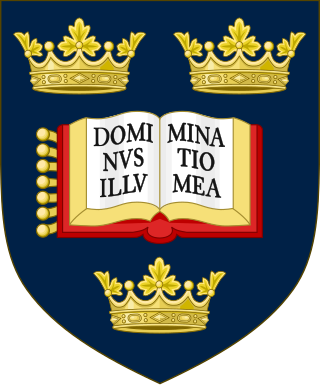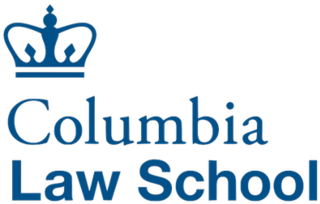Related Research Articles

The University of Oxford is a collegiate research university in Oxford, England. There is evidence of teaching as early as 1096, making it the oldest university in the English-speaking world and the world's second-oldest university in continuous operation. It grew rapidly from 1167, when Henry II banned English students from attending the University of Paris. After disputes between students and Oxford townsfolk, some Oxford academics fled northeast to Cambridge, where they established the University of Cambridge in 1209. The two English ancient universities share many common features and are jointly referred to as Oxbridge.

Yale College is the undergraduate college of Yale University. Founded in 1701, it is the original school of the university. Although other Yale schools were founded as early as 1810, all of Yale was officially known as Yale College until 1887, when its schools were confederated and the institution was renamed Yale University. It is ranked as one of the top colleges in the United States.

Columbia Law School (CLS) is the law school of Columbia University, a private Ivy League university in New York City.

The George Washington University is a private federally-chartered research university in Washington, D.C., United States. Originally named Columbian College, it was chartered in 1821 by the United States Congress and is the first university founded under Washington, D.C.'s jurisdiction. It is one of the nation's six federally chartered universities.

Harvard Kennedy School (HKS), officially the John F. Kennedy School of Government, is the school of public policy and government of Harvard University in Cambridge, Massachusetts.

The Catholic University of America (CUA) is a private Catholic research university in Washington, D.C., United States. It is the only pontifical university of the Catholic Church in the United States and the only institution of higher education founded by the United States Conference of Catholic Bishops. Established in 1887 as a graduate and research center following approval by Pope Leo XIII, the university began offering undergraduate education in 1904. It is classified among "R2: Doctoral Universities – High research activity".

The Kenneth C. Griffin Graduate School of Arts and Sciences (GSAS) is the largest of the twelve graduate schools of Harvard University, when measured by the number of degree-seeking students. Formed in 1872, GSAS is responsible for most of Harvard's graduate degree programs in the humanities, social sciences, and natural sciences. The school offers Master of Arts (AM), Master of Science (SM), and Doctor of Philosophy (PhD) degrees in approximately 58 disciplines.

Harvard Extension School (HES) is the continuing education School of Harvard University, a private Ivy League research university in Cambridge, Massachusetts, United States. Established in 1910, it is one of the oldest liberal arts and continuing education schools in the United States. Part of the Harvard Faculty of Arts and Sciences, HES offers both part-time, open-enrollment courses, as well as selective undergraduate (ALB) and graduate (ALM) degrees primarily for nontraditional students. Academic certificates and a post-baccalaureate pre-medical certificate are also offered.
In the universities of Oxford, Cambridge, and Dublin, Bachelors of Arts (BAs) are promoted to the rank of Master of Arts (MA), typically upon application after three or four years after graduation. No further examination or study is required for this promotion, which is a mark of seniority rather than an additional postgraduate qualification.
Harvard College has several types of social clubs. These are split between gender-inclusive clubs recognized by the college, and unrecognized single-gender clubs which were subject to College sanctions in the past. The Hasty Pudding Club holds claim as the oldest collegiate social club in America, tracing its roots back to 1770. The next oldest institutions, dating to 1791, are the traditionally all-male final clubs. Fraternities were prominent in the late 19th century as well, until their initial expulsions and then eventual resurrection off Harvard's campus in the 1990s. From 1991 onwards, all-female final clubs as well as sororities began to appear. Between 1984 and 2018, no social organizations were recognized by the school due to the clubs' refusal to become gender-inclusive.

The Cosmos Club is a 501(c)(7) private social club in Washington, D.C., that was founded by John Wesley Powell in 1878 as a gentlemen's club for those interested in science. Among its stated goals is, "The advancement of its members in science, literature, and art and also their mutual improvement by social intercourse."
There are many collegiate secret societies in North America. They vary greatly in their level of secrecy and the degree of independence from their universities. A collegiate secret society makes a significant effort to keep affairs, membership rolls, signs of recognition, initiation, or other aspects secret from the public.

Pi Sigma Alpha, the National Political Science Honor Society, is the only honor society for college and university students of political and social sciences in the United States. Its purpose is to recognize and promote high academic achievement in the field of political science. It is a member of the Association of College Honor Societies (ACHS) and adheres to all the standards set by ACHS for an upper-division, specialized honor society. Pi Sigma Alpha is not a social fraternity or club.

The National Society of Collegiate Scholars (NSCS) is a national non-profit academic honor society for college students in the United States. NSCS has active chapters at nearly 300 colleges and universities in the United States, including the District of Columbia and Puerto Rico.

The Association of American Universities (AAU) is an organization of predominantly American research universities devoted to maintaining a strong system of academic research and education. Founded in 1900, it consists of 69 public and private universities in the United States as well as two universities in Canada. AAU membership is by invitation only and requires an affirmative vote of three-quarters of current members.

The African-American upper class, sometimes referred to as the black upper class, the black upper middle class or black elite, is a social class that consists of African-American individuals who have high disposable incomes and high net worth. The group includes highly paid white-collar professionals such as academics, engineers, lawyers, accountants, doctors, politicians, business executives, venture capitalists, CEOs, celebrities, entertainers, entrepreneurs and heirs.

Texnikoi (TNK) is an honorary organization for students in the College of Engineering at Ohio State University in Columbus, Ohio, United States. It was established in 1924 and recognizes both academic achievement and campus and extra-curricular involvement.
The Economic Club of New York is a U.S. nonprofit and non-partisan membership organization dedicated to promoting the study and discussion of social, economic and political questions.
Christopher Sandy Jencks is an American social scientist.
In North America, fraternities and sororities are social clubs at colleges and universities. They are sometimes collectively referred to as Greek life or Greek-letter organizations, as well as collegiate fraternities or collegiate sororities to differentiate them from traditional not (exclusively) university-based fraternal organizations and fraternal orders that have historically acted as friendly societies or benefit societies to certain groups unlike the ones mentioned in this article.
References
- 1 2 3 "Harvard Club Of Washington Dc". Manta Media Inc. Retrieved 14 November 2013.
- 1 2 "Harvard Club Of Washington Dc in Washington Dc, District of Columbia (DC)". faqs.org. Retrieved 14 November 2013.
- ↑ "The Harvard Club of Washington D C". Bundle Corporation. 2001. Archived from the original on 25 April 2014. Retrieved 14 November 2013.
- ↑ name="The Harvard Club of Washington D C m"> "The Harvard Club of Washington D C". Harvard club of Washington DC. Retrieved 24 July 2016.
- 1 2 3 "Join the Harvard Club of DC!". Harvard Club of DC. Retrieved 1 December 2013.